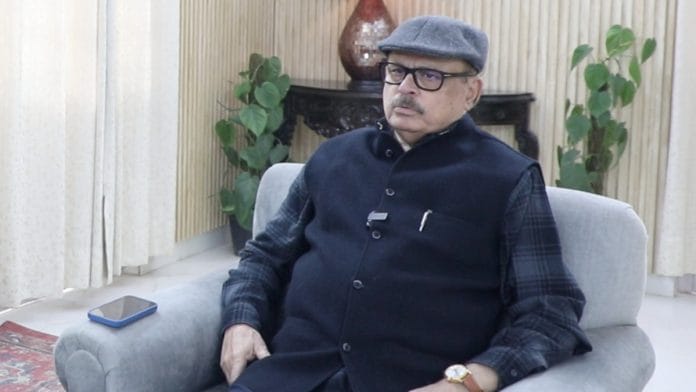New Delhi: Several top Congress leaders considered close to the current leadership have attributed the INDIA bloc’s crushing defeat in the Bihar assembly elections to a “collusion” between the Election Commission and the ruling NDA, leading to an uneven playing field.
There were a few voices in the party, though, that had warned the Congress leadership that the party’s campaign in Bihar could be on the wrong track, due to a combination of factors including weak candidates and lack of coordination with alliance partner RJD. Lok Sabha MP from Katihar, Tariq Anwar, is among those voices.
In an interview with ThePrint Tuesday, Anwar, among the most experienced faces of the Congress in Bihar, said that above everything else, it was the appointment of Krishna Allavaru as the party’s Bihar in-charge that sealed the party’s fate in the state. The Congress won only six out of the 61 seats it contested in Bihar this time.
“This time I was afraid from the very beginning as somebody who does not possess any knowledge of Bihar, does not have any idea, never contested any election, was sent there. I felt that was a wrong decision in the very beginning. His style of working was not correct. When you start on the wrong foot, how do you expect the ending to be?” Anwar said.
Hailing from Andhra Pradesh, Allavaru worked as a consultant with various private firms like KPMG and Shaadis.com, before joining the Congress in 2010. He is among the crop of Congress leaders considered very close to Leader of Opposition (LoP) Rahul Gandhi and was appointed the party’s Bihar in-charge in February, replacing Mohan Prakash.
Questioning the timing of Allavaru’s appointment to the post, Anwar said that expecting an in-charge to understand a state as complex as Bihar within a few months was unrealistic. He argued that half of an election’s outcome depends on the choice of candidates—an area where he believes mistakes were made.
“You need candidates who are popular in the constituency. Overall selection was flawed,” he said. Anwar, who is serving his sixth term as a Lok Sabha MP, alleged that Allavaru did not take state leaders into confidence, avoided consultations and discouraged meetings. The Katihar MP added that while the National Democratic Alliance (NDA) also faced its own internal tensions, it was quick to resolve them.
“Many seniors were not consulted. Whenever any office bearer, worker, or aspirant went to him (Allavaru), they never returned satisfied,” Anwar said.
The Congress, he argued, should not have contested more than 50 seats, considering its weak organisational presence in Bihar and low strike rate in the 2020 assembly elections. In 2020, the party had won only 19 of the 70 seats it contested.
He also questioned Bihar Congress president Rajesh Ram’s organisational credentials, noting that he was only a second-term MLA. “He was not the right choice for the post of president,” Anwar said.
Anwar, who also served as the president of the Bihar Congress from 1988-89, said he shared these observations with party president Mallikarjun Kharge in a meeting held after Bihar assembly election results were announced on 14 November. Kharge would soon call a meeting of the Congress Working Committee (CWC), the party’s highest decision-making forum, to discuss the matter, he added.
The Congress could also explore the idea of forming a specific committee to analyse the Bihar results, Anwar said. When it was pointed out that the reports of such committees are never made public or discussed in party forums by the Congress leadership, Anwar said, “There is no point hiding anything.”
Anwar argued that Congress must return to grassroots work instead of relying on top-down fixes. “Our grassroots organisation is weak. There is no booth management. Changing a president or observer won’t work,” the Lok Sabha MP said.
Anwar also accused the Election Commission of failing to act neutrally, pointing to issues related to voter deletions under the Special Intensive Revision (SIR) initiative.
Anwar said that the victory of five All India Majlis-e-Ittehadul Muslimeen (AIMIM) candidates in Bihar was a reflection of the growing influence of fundamentalists in the Muslim community, as a response to the rising “Hindu communalism”. Sections of the community are drifting towards Muslim identity-based parties because they view the Congress as ineffective in countering the BJP, he said.
Warning that “communal forces have entered the Muslim community”, he described the AIMIM and the BJP as “two sides of the same coin”. The Congress, he noted, has historically elevated Muslim leaders, naming past chief ministers in Bihar, Assam, and Rajasthan.
(Edited by Sampurna Panigrahi)
Also read: From KPMG and Shaadis.com to running Congress affairs in Bihar, who is Krishna Allavaru







The main cause of defeat of congress+ is unnecessary muslim love.